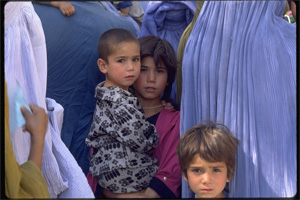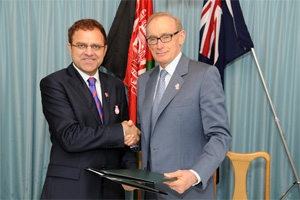On 8 July at a conference in Tokyo, the international community pledged US$16 billion over four years in ongoing assistance to support Afghanistan's social and economic development. The commitment sent a strong message to the people of Afghanistan - they will not be abandoned by the international community after transition.
Afghanistan remains one of the poorest countries in the world with enormous social and economic development needs. Over the past decade, the international community has assisted the Afghan Government deliver substantial improvements to the lives of its people. However there is still much to be done to achieve the Afghan Government's strategic vision of self-reliance.
The Prime Minister and Foreign Minister announced at the NATO/ISAF Leaders Summit in Chicago in May that Australia intends to increase its Official Development Assistance (ODA) to Afghanistan from an allocation of $165 million in 2011/12 up to $250 million per year by 2015/16. Over the four years 2012-13 to 2015-16, Australian aid to Afghanistan is expected to total approximately $900 million.
Support, but not unconditional
The international community also made it clear in Tokyo that its ability to sustain support for Afghanistan depends on the Afghan Government delivering on agreed governance and development commitments.
These commitments are set out in a Mutual Accountability Framework agreed on by all parties at the Tokyo Conference. They stipulate the Afghan government will:
- conduct transparent, inclusive and credible elections
- strengthen public financial management systems and reduce corruption
- improve health and education outcomes including for women and girls and promote their active participation in Afghan society
- implement a set of national priority development programs aimed at achieving the Millennium Development Goals in Afghanistan.
The framework also includes a shared monitoring mechanism to review progress and effectiveness.
The framework for Australia's ongoing support
At the 8 July Tokyo Conference, Foreign Minister Carr and Afghan Finance Minister Zakhilwal also signed a bilateral Memorandum of Understanding (MoU) on Development Cooperation which sets out mutual development priorities in the security; governance, rule of law and human rights; and economic and social development sectors.
Australian support will be aligned with the priorities of the Afghan government and focus on education, agriculture and rural development. Improved governance will also be a focus - building capacity in public financial management, elections, mining regulation and support for efforts to eliminate violence against women.
Protecting the rights of women and girls
Despite gains made over the past year, the improvement of women's rights in Afghanistan is coming from a very low base. Over 3 million girls now go to school and female literacy is on the rise but Afghanistan remains one of the worst countries in the world to be born female.
Global condemnation followed the recent release of a video depicting the public execution of a young woman accused of adultery in a village not far from Kabul.
Australia is committed to ensuring the rights of women and girls remains a focus on international support. At the 8 July Tokyo Summit, Foreign Minister Carr pledged $17.7 million to support the Afghan Government to address violence against women in Afghanistan and provide support to women affected by violence.
To date, Australia's assistance has delivered:
- support for more than 30 female health professionals and more than 80 community health workers
- antenatal visits for 80 per cent of pregnant women in Uruzgan
- training on legal rights for 13,000 home-bound women in two rural province and
- 40 scholarships and training for female teachers to study overseas and return to teach in Afghan schools.


